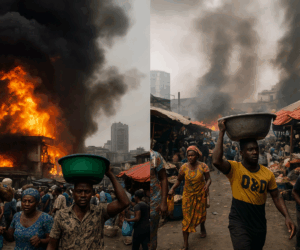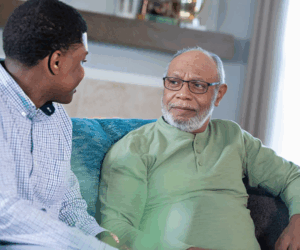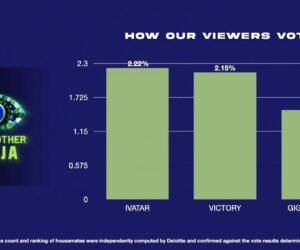Cities like Lagos, Abuja, and Port Harcourt offer many opportunities, but they are also emotionally heavy spaces. You wake up every day already behind schedule, already anxious, already thinking about traffic, bills, and deadlines.
Life in the city has become a race no one signed up for, but everyone is forced to keep running. The body was not designed to live in a state of perpetual alertness; unfortunately, this is what urban life demands.
Lagos traffic alone can subtract half your humanity before 10 am. That’s two hours of honking, fumes, tension, and overstimulation before work even starts. By the time you arrive at your destination, you’re already exhausted.
Nothing about this pace is normal. People are not living, they’re just surviving. They are sprinting through days they don’t have time to feel, through emotions they don’t have space to process, through heaviness they don’t have the language to describe.
This is why so many people feel disconnected from their own lives; everything is about the next task, the next bill, the next rush. Rest has become a guilty pause, a norm that’s not supposed to be.
The economic pressure we are silently drowning under
The Band 8 looks like Xiaomi has smoothed out the edges to make it more stylish, more comfortable, and more fun to use.
Compare Kenstar vs Buchymix air fryers based on size, durability, warranty, features, and value for money to make the right choice for your kitchen.
Soft lips, smooth skin, longer lashes, and squeak-free doors. Vaseline does it all. Here’s how.
&format=jpeg)
We are silently drowning under the economic pressure
The second weight is money, or, more accurately, the fear of not having enough of it. The economic reality of today is not what our parents lived through.
Yes, they struggled, but things were not this brutally inflated. Our generation is paying double, sometimes triple, for a life that offers less stability, less hope, and less breathing room.
A lot of young Nigerians are earning less than minimum wage, and even those “earning well” are still scraping by because everything is expensive and nothing is stable. Salaries end before the month starts. Rent, food, transportation, electricity, data; each feels like a slow, patient thief.
There is a silent grief in this kind of adulthood, one that not many people are ready to talk about openly. There is that deep emotional shame attached to being hardworking yet constantly on edge financially.
The dream was stability, but what many people got instead was survival mathematics, mental gymnastics, and weighing the necessity of Agege bread and beans against the profound need to satisfy a shawarma craving.
And with the obleé season upon us, a new kind of pressure is born. Cities, especially Lagos, would become a festival where you are expected to show up, dress up, attend everything, belong somewhere, look like you’re doing well, even when your account balance is on a hospital bed, and you could almost hear the ‘beep beep’ if you listen close enough.
This generation is the one caught in the harshest version of adulthood, the one where working hard does not guarantee comfort, where dreams cost more than earnings, and where simply staying afloat feels like a full-time job.
The loneliness of crowded cities
Let’s talk about the loneliness. City life creates the strangest kind of loneliness, the one that exists even when you are surrounded by people. You can live among millions and still feel completely unseen. Everyone is busy, everyone is rushing, everyone is stretched thin.
Friendships now survive on postponed catch-ups and “we must link up soon” promises that never materialise. By the time a free day finally comes, all they want is rest and silence, which inevitably means the hangout never makes it out of the group chat.
Connection requires emotional energy, and young Nigerians barely have enough of that left to keep themselves functioning. When you are constantly in survival mode, relationships start to feel like extra labour. You love your friends, but you no longer have the time to show up for them consistently. You care, but you are tired.
Slowly, without meaning to, people start disappearing into themselves.
Love is harder because everyone is exhausted
&format=jpeg)
These days, love is transactional
Romantic relationships have not escaped this exhaustion either. Love is no longer purely emotional; it has become economic, psychological, and transactional. People are less concerned about love. It’s now a “Can you sustain me emotionally and financially?”
You can’t blame the women for wanting financial security, though. The world is too hard to survive alone. But our young men, too, are collapsing internally, craving softness and emotional refuge they themselves cannot maintain. Two tired people trying to love each other in a hostile economy often end up treating it as a duty, not intimacy.
The horizon of love is turning bleak; the burning lamp at the end of the tunnel has been quenched by self-serving, egocentric, self-absorbed, inconsiderate and toxic behaviours.
Dating now feels like negotiation, and vulnerability is expensive. Sadly, many young people would rather stay guarded than risk the emotional debt of another heartbreak.
The emotional price nobody is quantifying
High blood pressure used to be a late-stage danger reserved for people in their forties and fifties. Now it’s hitting twenty-three-year-olds who haven’t even seen half of life yet. We have people experiencing quarter-life crisis and hustling extra hard just to make ends meet.
Young Nigerians are losing themselves in the rat race before they’ve had a chance to know it fully. Hobbies have disappeared, curiosity has disappeared, playfulness is replaced by sarcasm and online ‘drags’. Many people don’t even know who they are outside of survival.
Can this be salvaged?
Maybe. Maybe not.


&format=jpeg)
&format=jpeg)
&format=jpeg)
&format=jpeg)
&format=jpeg)
&format=jpeg)






